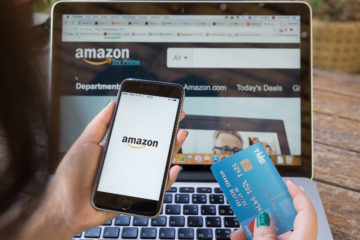The Market Institute Senior Fellow Norm Singleton has a new piece in Real Clear Markets warning conservatives their support of ‘Big Tech’ over regulation will lead to nothing good.
See below:
“Rep. Ken Buck (CO-4) is one of the few members of Congress we can consistently count on to defend limited government and free markets. As such, it’s disappointing that in a recent appearance on Newsmax TV, Buck addressed concerns about how his policy proposals would affect Amazon Prime’s one- or two-day delivery.
He said, “You don’t need next day delivery. You can go to the store and buy toilet paper. Or you can order three or four days ahead of time.”
Since the human race survived hundreds of thousands of years without guaranteed two-day delivery, Rep. Buck is technically correct. However, guaranteed two-day delivery has made life easier for millions of Americans who don’t need to worry about making sure they have enough of essential household goods on hand just in case.
One- or two-day delivery has also been a godsend for those who realized they forgot to get Uncle Bob a Christmas gift or whose child made a last-minute addition to their Christmas wish list on December 22.
One- or two-day delivery is just one of the many conveniences consumers did not know they needed until innovators created the service for them. How many people knew they needed Internet access on their mobile phone until they got it? Further, 30 years ago, how many people knew that one day they couldn’t imagine living without a cell phone?
Of course, not every innovation is embraced by consumers or viewed as life changing. Whether or not a new product will become something consumers cannot live without is up to consumers to decide, not bureaucrats or politicians. As the great economist Ludwig von Mises put it, those with an economic critique of capitalism fail to grasp the sovereignty of the consumers in the market economy.
Consumer sovereignty means leading businesses that wish to remain leaders must continue to innovate to stay up to date on changing consumer tastes. Otherwise, the marketplace picks new leaders. Remember when Blackberries were cutting edge status symbols, or when pagers were? Similarly, in the 1990s, the Lina Khan and Ken Buck-style technophobes of the 20th century’s closing decade were cautioning that without government intervention, the first-mover tech companies would have unshakable monopolies.
At the time they were issuing warnings about AOL’s potential monopoly. You’ve got mail!
Another example of supposedly dominant firms being subject to market discipline can be seen even in current headlines. Big tech companies, such as Google and Meta (the parent company of Facebook), have been laying off thousands of workers as they face changing market conditions.
Buck supported Sen. Amy Klobuchar’s bill, “American Innovation and Choice Online Act,” last Congress in the (likely mistaken) belief that it would stop big tech firms from de-platforming conservatives, like AT&T recently did with Newsmax. While he is right to be concerned about this issue, he is mistaken to allow these concerns to cause him to abandon his traditional support for free-markets. He is starting to sound like a Soviet central planner determining how much, if any, toilet paper and potatoes “the people” will receive under the new five-year plan.
Instead of increasing government power to limit our access to desired goods and services, Buck and conservatives should be focusing on stopping federal agencies from “suggesting” what stories to suppress and which users to deplatform.”


